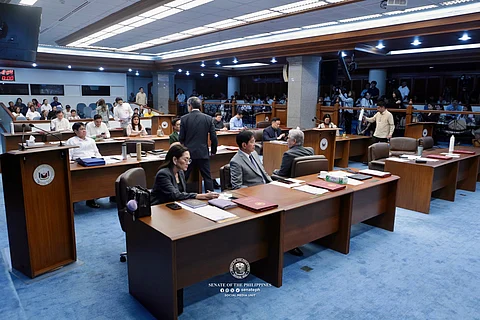
- NEWS
- the EDIT
- COMMENTARY
- BUSINESS
- LIFE
- SHOW
- ACTION
- GLOBAL GOALS
- SNAPS
- DYARYO TIRADA
- MORE

The Senate should not insist on dismissing the impeachment case against Vice President Sara Duterte pending the Supreme Court’s (SC) decision on the motion of the House of Representatives, as doing so will only expose its ulterior motive from the very beginning.
Speaking with the press ahead of the Senate vote on whether or not to outright dismiss the impeachment case in compliance with the SC ruling, House prosecution panel spokesperson Antonio Bucoy said it is puzzling that the upper chamber is now scrambling to drop the trial when it did not act with haste in the past months despite the Constitution stating that the impeachment shall proceed “forthwith.”
“It will only show that they are really rushing to terminate this, when before they were not in a hurry despite [the Constitution requiring them to] forthwith proceed,” said Bucoy partly in Filipino. “Why are they acting differently now? They want to finish it, dismiss it.”
Bucoy reminded the Senate to exercise prudence, as insisting on voting is preempting the SC’s decision on the House’s motion for reconsideration, which the lower chamber filed on Monday.
Further, he said, it would be “a waste of time” because the Senate will nevertheless be compelled to convene as an impeachment court again if the SC reverses its decision and rules in favor of the House.
The SC had declared that the Senate had no jurisdiction over the impeachment case since it was unconstitutional, null, and void ab initio (from the beginning) for violating Article XI, Section 3, Paragraph 5 of the Constitution which prohibits the filing of more than one impeachment complaint against the same official within a one-year period.
To recall, Duterte was slapped with three impeachment complaints in barely two weeks in December last year, but was only officially impeached on 5 February after the fourth complaint was signed and endorsed by 215 members of the House — constituting the articles of impeachment.
The votes overwhelmingly surpassed the one-third threshold to bypass committee hearings and be transmitted directly to the Senate for trial — a shortcut allowed by the Constitution.
The SC decision stated that the House had trampled on Duterte’s right to due process when it expedited the proceeding, robbing the VP of the opportunity to answer the allegations against her. The House, however, insisted this requirement did not exist in the Constitution.
In light of the House’s motion for reconsideration, the SC reiterated on Tuesday that its unanimous decision on the impeachment was immediately executory.
Immediately executory is not equivalent to finality, according to Bucoy. It only allows the Senate to enforce the order, but the same is not absolutely final since it’s still subject to reversal.
“It is not yet final. In other words, there is leeway,” Bucoy said. “The impeachment court should also give way out of respect for the Supreme Court. They should be more cautious and afford the Supreme Court the opportunity to decide on the motion for reconsideration.”
In its motion, the House upheld its position that the one-year bar was not violated because it was the filing of the fourth impeachment complaint, constituting the articles of impeachment, that brought the one-year prohibition into effect.
This contravenes the high court’s ruling that the articles were barred because the House’s putting the first three complaints in its archives rendered it “effectively terminated and dismissed,” which triggered the one-year bar.
The House argued that the SC, in effect, introduced a new interpretation of the one-year bar, which the SC itself outlined under Francisco v. House of Representatives and Gutierrez v. Committee on Justice.
Under the jurisprudence, initiation only takes place after the referral of the impeachment complaint to the House Committee on Justice or by the filing with the secretary general by at least one-third of the members of the House.
